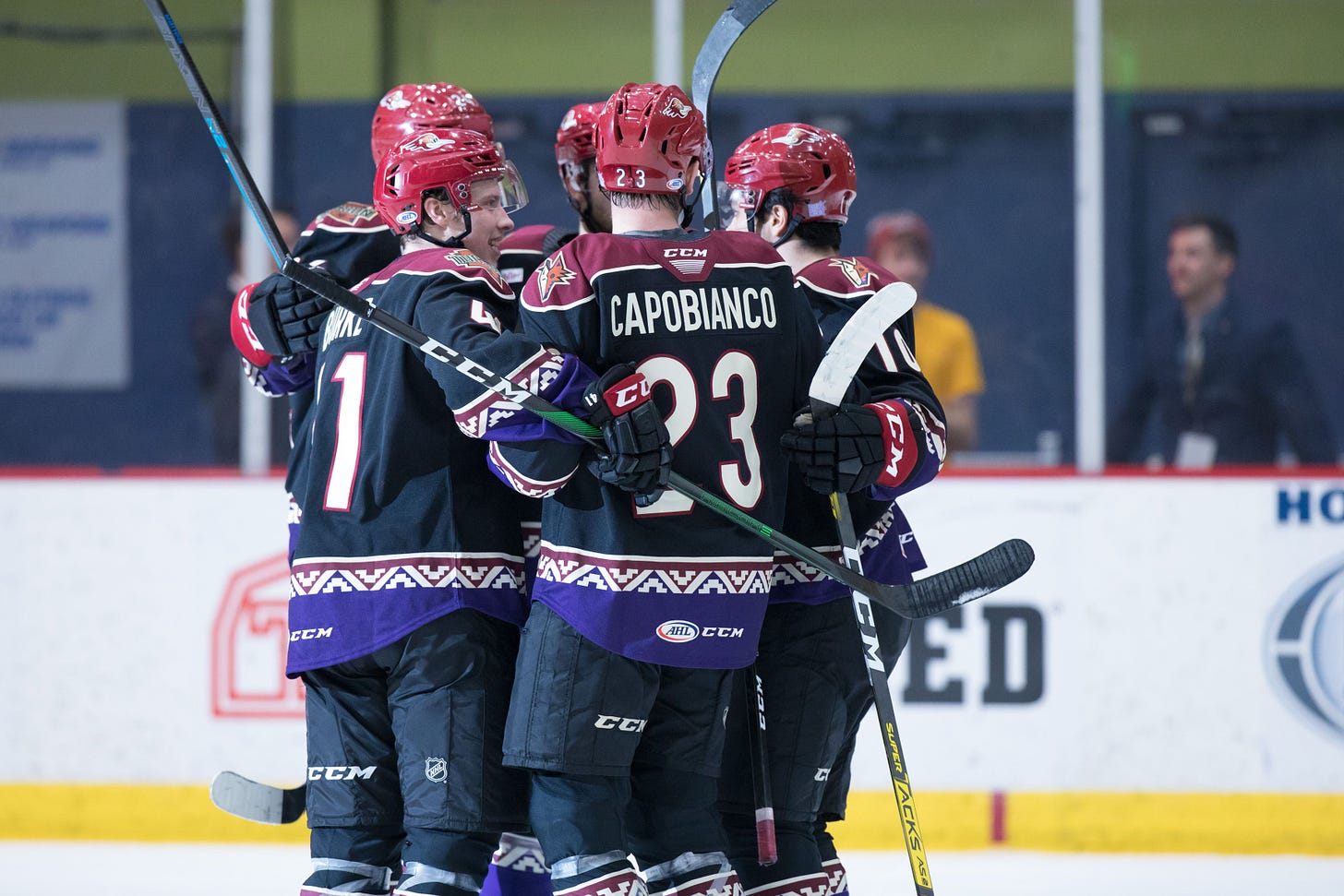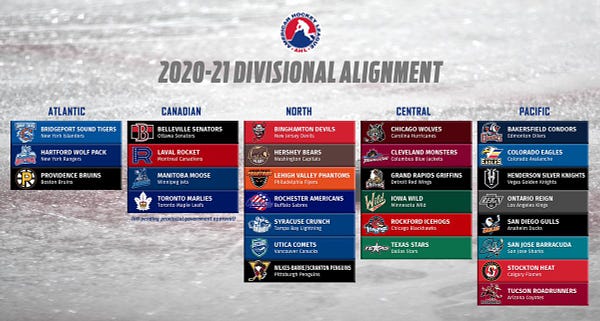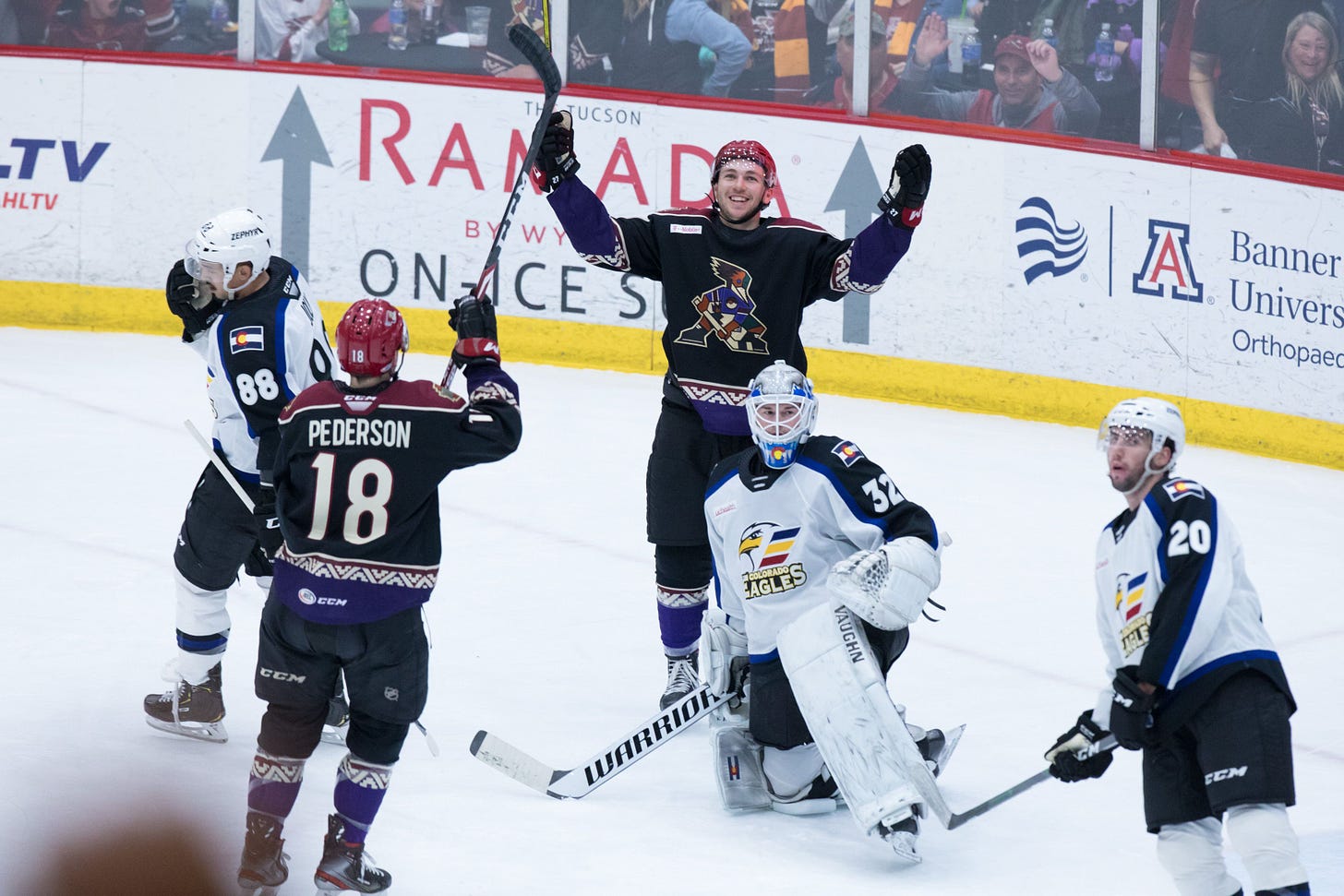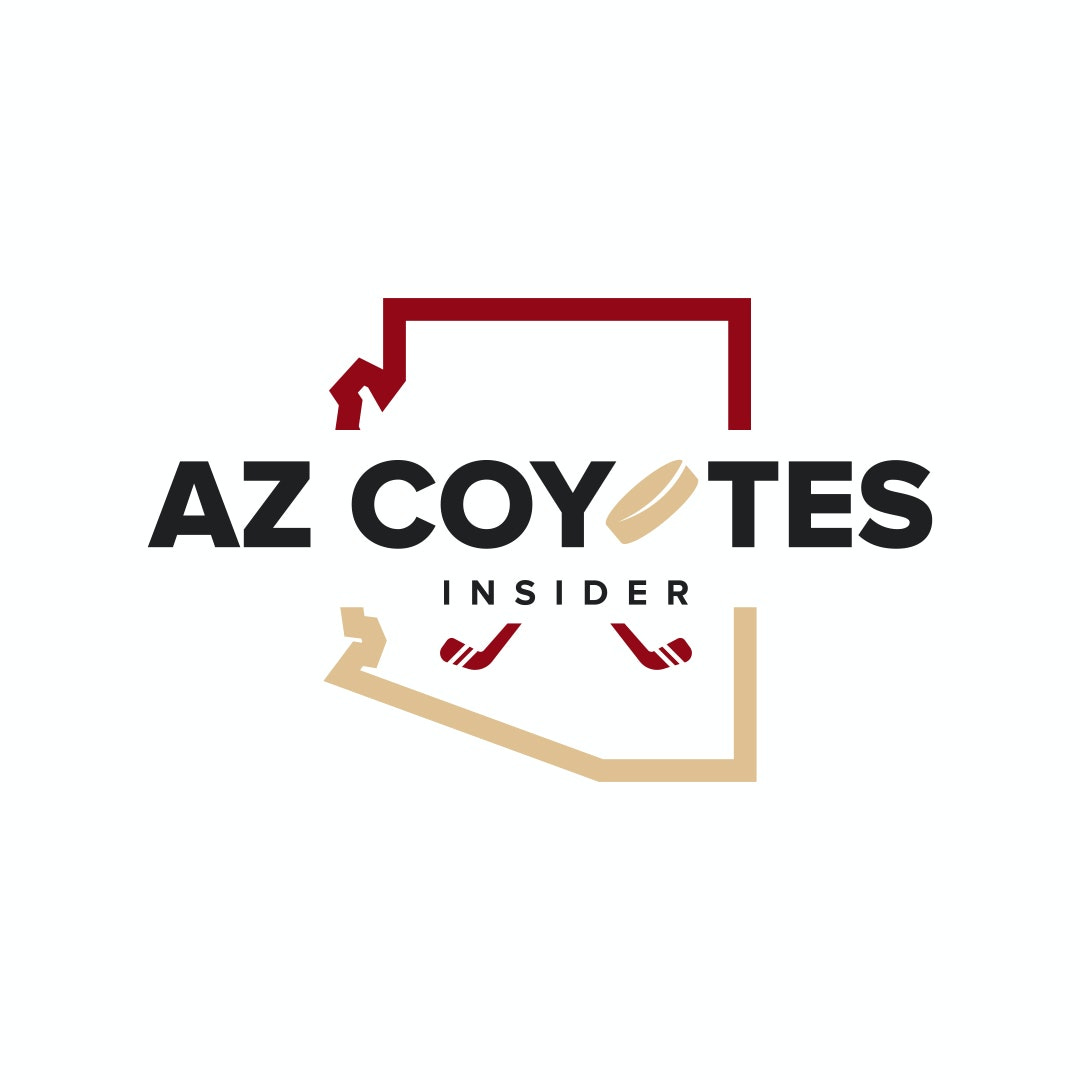A Q&A with Tucson Roadrunners president Bob Hoffman ahead of a most unusual AHL season
Welcome to the AZ Coyotes Insider newsletter. I generally publish stories four to six times per week (some of them free). By subscribing, you’ll be supporting independent, accountable journalism. Subscribe now so you won’t miss a story.

Bob Hoffman had a pep in his step when he went to work on Tuesday morning. For the first time in 10 months, the Tucson Roadrunners president had real clarity on the fate of the American Hockey League’s 2021 season, and that clarity provided optimism.
One day earlier, the AHL announced that 28 of its teams, including the Roadrunners, would be returning for a condensed and shortened season under a most unusual five-division alignment.


While the Charlotte Checkers, Milwaukee Admirals and Springfield Thunderbirds opted out of the season, and while four teams were granted provisional relocation for this season (the Binghamton Devils to Newark, New Jersey; the Ontario Reign to El Segundo, California; the Providence Bruins to Marlborough, Massachusetts; and the San Diego Gulls to Irvine, California), the Pacific Division remained intact, and even added one team with the birth of the Henderson Silver Knights, the Vegas Golden Knights’ affiliate.
“It was an exciting day,” Hoffman said. “Really for the first time since March, there was that feeling that the black cloud was gone, that there was hope that a game was going to happen soon.
“You can talk about it and work on hypotheticals all you want, but until that vote came and we knew we had a league that was willing to support and back us, and an organization that was willing to move forward, it was always a question mark. It’s nice to know that hockey is coming back. It will be almost a year without it in the American Hockey League and in Tucson. It’s kind of a rebirth and an opportunity to get out there with something new at a time when I feel like our fans and the people of Southern Arizona kind of need that lift. It’s going to be a sprint, but it’s going to be fun.”
I caught up with Hoffman on Tuesday afternoon and he agreed to share as many details as he could about the upcoming season in a Q&A.
What have the past 10 months been like for you?
Hoffman: It’s tough sometimes, but it’s important to always keep things in perspective with everything else that is happening in the world, with deaths, lost jobs. The real life decisions that had to be made with regard to staffing and people’s employment was at the forefront of everyone’s mind and there were decisions that this pandemic unfortunately forced into the fold.
At the same time, you have to realize that for our fan base this is sports. To a lot of them, this is what they get up thinking about and what they go to bed thinking about. They eat and drink it so it’s a huge gap and a missing piece, whether it’s for their mental health or their approach to every day.
It’s a smaller group than an NHL team has, but it’s our family so not playing games and really not even being able to see folks that have become a part of our every-day life since the team launched, it was challenging.
By the time the AHL season starts, most of the Roadrunners will have gone 11 months without a game. What sort of impact do you think that will have on their preparedness for the season and their development?
Hoffman: That’s a little bit of a TBD. We’ll have to see how quickly they can come back and how that growth chart looks. The plan that the Coyotes and coach Jay Varady had in place was working and it was on track. Who knows what last spring would have led to, but there was certainly success on the horizon and to have that pause and that long of a delay, it’s going to be important to get back to that plan. What sort of setback this creates we’ll have to see but the one thing I do know about Jay and (Roadrunners GM) Steve Sullivan is from a preparation standpoint, there’s no one I have worked with that is more prepared. They are going to have these guys ready and I have no doubt they’ll get back on track as quickly as possible.
What details can you provide about the season and the schedule?
Hoffman: The season starts Feb. 5 and ends on May 16. The playoff details and format will come at a later date. I hope to have a draft of the schedule this week and I am guessing there will be an announcement next week.
Will the Pacific Division teams only play each other, as the NHL will do with its divisions?
Hoffman: It is not finalized yet but that is the plan. The approach being taken almost treats each division like its own league.
How many games will the Roadrunners play?
Hoffman: The Pacific Division teams are going to play anywhere from 38 to 40 games so it’s a significant amount of games, more than the other divisions. There is more opportunity to develop from that amount of games.
So with seven division opponents, it will be an unbalanced schedule with more games against some teams than others?
Hoffman: Yes. I don’t think there will be balance with any of the divisions. The focus is really on trying to minimize travel as much as possible, minimize risk, minimize expenses, so I think you’ll see larger sets of games as opposed to a Friday night game in Ontario and a Saturday night in San Diego. You’ll probably see two consecutive games in one city. Maybe you’ll spend 10 to 12 days out on the road so you can knock out a couple of those series at once.
What will travel look like in a COVID world?
We’re looking at travel right now to figure out the smartest move. We’re fortunate that a couple teams within our division aren't that far away with southern California and the expansion of Vegas into Henderson. Even so, going to the old days of a bus league is still challenging when you’re looking at Stockton or San Jose or Loveland, Colorado.
The Pacific Division used to present challenges with the amount of teams and games that you were able to play. Is it a little strange to be talking about this embarrassment of riches for what is now the biggest division in the league?
San Diego used to be our closest opponent and now you can draw a circle around San Diego, Ontario, Henderson and Palm Springs when Seattle comes on board (in the NHL). I think we can build some really good rivalries with Henderson and then Palm Springs. It’s nice to have so many teams within close proximity.
Will the Roadrunners allow fans in the stands when the season begins?
It’s literally a daily process that we engage in with the county (Pima). The cooperation has been fantastic so far with the building and the county. We have the approval to play games. The capacity questions will come into focus when we get a little closer. It’s awfully difficult to put your glasses on right now and say what it looks like today when our first home game may not be until Feb. 5, or Feb. 12 if things change.
In mid-January, we’ll begin a process of reviewing what the county looks like, what southern Arizona’s trends are and have a decision made at that point what the number will be. I fully expect to have reduced capacity at the beginning, for sure, and probably well into the season, but our hope is that the numbers continue trending in the right direction and we can continue to add a number and give more and more fans an opportunity to become a part of it.
Hopefully there will be as few hurdles as possible. The last thing we want to see is people getting sick and us being a part of something that might be dangerous.
It’s an annual challenge with AHL teams, but with taxi squads and more players being part of the NHL club, is it even more difficult to plan your roster when you don’t know which players will be around on a daily basis?
(Coyotes GM) Bill Armstrong is looking at that much more closely than I am. To see the prospects of a handful of guys not being available, or being up in Glendale and not being able to play down here, the depth chart will certainly be tested. You start thinking selfishly how that’s going to impact the Roadrunners, but then you also have to look at it relatively speaking. That’s the impact it’s going to have on every team so the Ontario Reign could come in here with their top five prospects up in L.A. on a taxi squad. It will be a real test of how well management has filled the roster and filled the system. It will also give other guys an opportunity to step up and develop in different roles.
What else have you been able to do now that you know a season is coming?
The last month, as this has started to become more of a reality, it has been great reconnecting with our corporate partners and fan base to see how excited they are and the appetite people have for sports. Fans down here can live vicariously through the TV, watching the Cardinals or Suns or Diamondbacks, but they want to know that the home team is playing. A lot of people have that connection to us and that is what we have tried to create by putting our footprint here in Tucson.
In the 11 months without a game, we have really had to reinvent some of what we do and we have been able to make a lot of great connections in the community with some of the nonprofits and people who have been struggling during this time. Those connections are lifelong connections now and we’ll continue to grow that. I have challenged my staff to maintain those ties and strengthen them.
Follow Craig Morgan on Twitter: @CraigSMorgan





